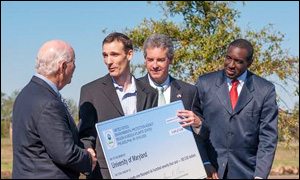News Story
Engaging Communities for a Cleaner Bay

AGNR professor Paul Leisnham accepts congratulations from U.S. Senator Ben Cardin for winning a $700,000 EPA grant. Image Credit: Edwin Remsberg.
Researchers from the University of Maryland, including Department of Civil and Environmental Engineering professor Allen Davis and Fischell Department of Bioengineering associate professor Hubert Montas, have been awarded a competitive grant from the Environmental Protection Agency (EPA) for an innovative proposal designed to help communities tackle stormwater and reduce pollution to the Chesapeake Bay.
Representatives from the College of Agriculture and Natural Resources (AGNR), EPA, community organizations and U.S. Senator Ben Cardin gathered on September 24 to announce the $700,000 grant at the Bladensburg Waterfront Park overlooking the Anacostia River. The funding will allow researchers to develop a strategic, community-based plan for improving stormwater runoff, the fastest growing source of pollution to the Chesapeake Bay and its local rivers including the Anacostia and Patuxent.
Paul Leisnham, an assistant professor in the Department of Environmental Science and Technology (ENST), is serving as the lead for the UMD research team, which includes members from AGNR and University of Maryland Extension (UME), as well as the School of Public Health and the A. James Clark School of Engineering.
“We have scientists, engineers, hydrologists, public health and Extension personnel, and we’re partnering with a number of community-based organizations,” said Leisnham. “We’ll really know at the end of the project what works, what doesn’t work and we’ll have long-term, sustainable success.”
Researchers will focus specifically on improving the management of stormwater in Howard County, Md.’s Wilde Lake watershed and the District of Columbia’s Watts Branch watershed. The group will use a unique and comprehensive approach that includes surveys, interviews, photo documentary and cutting-edge diagnostic software to identify problem areas, increase the use and awareness of best management practices, and develop solutions.
Montas will spearhead the development of the diagnostic decision support system (DDSS) that will be used to guide the implementation of the best management practices (BMP) for the watersheds.
“[The system] will be developed to support precise spatial targeting of…pollution hot spots in the study watersheds, and provide effective BMP recommendations for each,” he explains, adding that it is also designed to include data reflecting community response. “The DDSS will be validated against existing monitoring data and will be applied to assess BMP adoption patterns and [their] long-term water quality impacts…Mobile platforms will also be developed to provide internet-based remote access [to] the DDSS for watershed stewards and stakeholders.”

A diagram of the Diagnostic Decision Support System being developed by Professor Hubert Montas.
"The development and application of the [diagnostic decision support system], within the framework of this study, is expected to provide the crucial coupling between social sciences and pure sciences that is critically needed to successfully improve stormwater quality and quantity in urban and suburban environments."
BioE associate professor Hubert Montas.
“The development and application of the DDSS, within the framework of this study, is expected to provide the crucial coupling between social sciences and pure sciences that is critically needed to successfully improve stormwater quality and quantity in urban and suburban environments,” says Montas.
The three-year grant is being funded through the EPA’s Science to Achieve Results (STAR) program, which awards research funds in numerous environmental science and engineering disciplines.
“These are very competitive grants—they’re very difficult to get,” remarked Senator Cardin. “This speaks volumes to the fact that the University [of Maryland] has the capacity, as well as the relationships with the private sector and local governments, to be able to make a difference here and give confidence, so it’s a real feather in the cap of the university.”
For more information, contact Sara Gavin at 301-405-9532 or sgavin@umd.edu.
Published October 12, 2012









